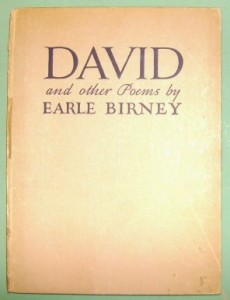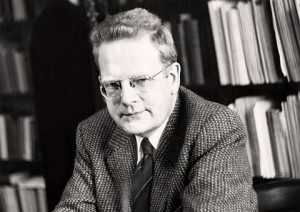Another find from Bob Denham, this interesting passage from the Canadian poet Earl Birney:
There was a time [in 1933] at some Victoria College student debate when I was almost diverted back to my earlier skepticism about human affairs by the arguments of a cherubic yet very intelligent undergraduate who was quoting [Egon] Friedell and other historians I had not even heard of. His name was Norrie Frye. But I was by nature the optimistic sort of revolutionary and decided to cast my dice with the creator of the Red Army, Maurice Spector.
(Earle Birney, Spreading Time: Remarks on Canadian Writing and Writers, Book I: 1904-49. Montreal: Véhicule Press, 1980, p. 27)
Almost a decade later Frye reviewed Early Birney’s first collection of poetry, David and Other Poems, in The Canadian Forum (December 1942):
This is a book for those interested in Canadian poetry to buy and for those interested in complaining that we haven’t got any to ignore. Anyone who follows Canadian verse at all closely will be very pleased to see Mr. Birney’s fugitive pieces gathered into one little volume, and anyone who read the title poem when it first appeared in the Forum will be keenly interested in finding it again in a published book as part of larger collection.
The people who are familiar with the conventions of modern poetry, who can grasp its difficult language and place its recondite allusions, now form a specialized cult largely confined to universities. David will get the full approval of this audience as being on its own merits a touching, beautiful, and sensitively written story. But a large reserve of intelligent readers, not in the cult but willing to listen to a poet who has a real story to tell and who tells it simply and honestly, will also like this poem. The more blasé will take a while to recover from their surprise at seeing, in a volume of contemporary verse, a straightforward narrative cut to fit the “common reader,” without flounces of fake symbolism, gathers of atmosphere, tucks of philosophic rumination, or fullness of garrulous comment. But they will like it too. David is the best thing of its kind that I have seen in current poetry—and for some benighted reason its kind is rare. . . .
(CW 12, 23)
Frye concludes the review: “In case you didn’t get the point the first time, for those who care about Canadian poetry this book is good enough to buy, not to borrow or get from the library” (25)
Anyone growing up in the fifties and sixties is unlikely to have escaped reading this poem in high school, and, if one was lucky enough to be in the presence of a gifted teacher, to have been haunted by its vision and power. Birney is one of many Canadian writers emerging in the mid-twentieth century who owed a debt to Frye’s critical engagement with Canadian literature for the place they hold in the canon and in readers’ imaginations.

